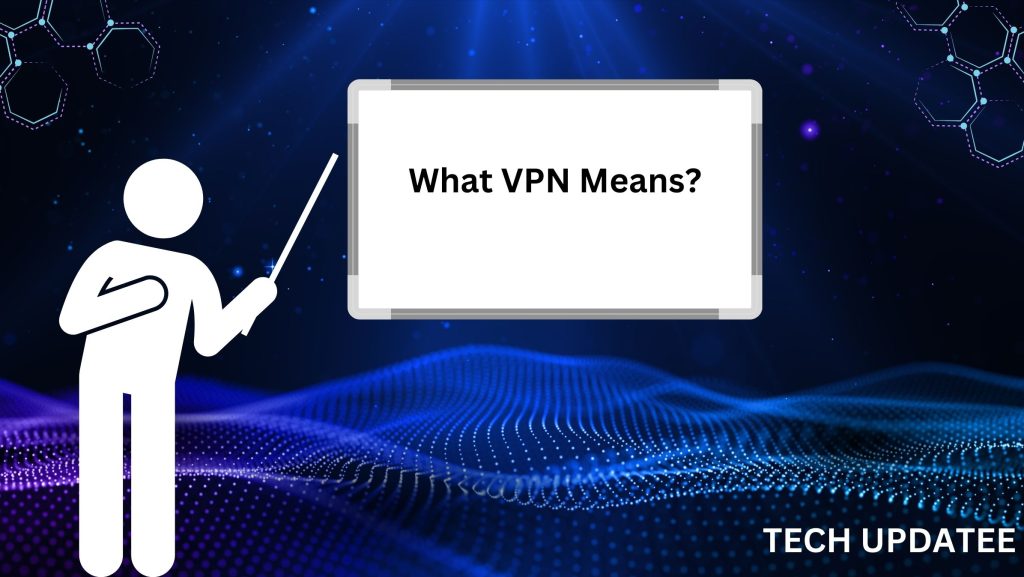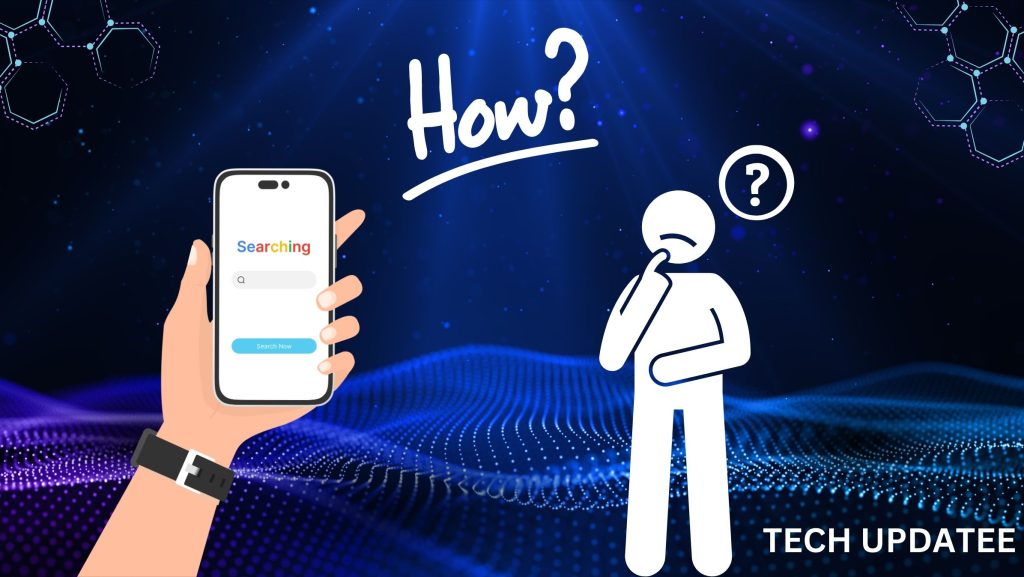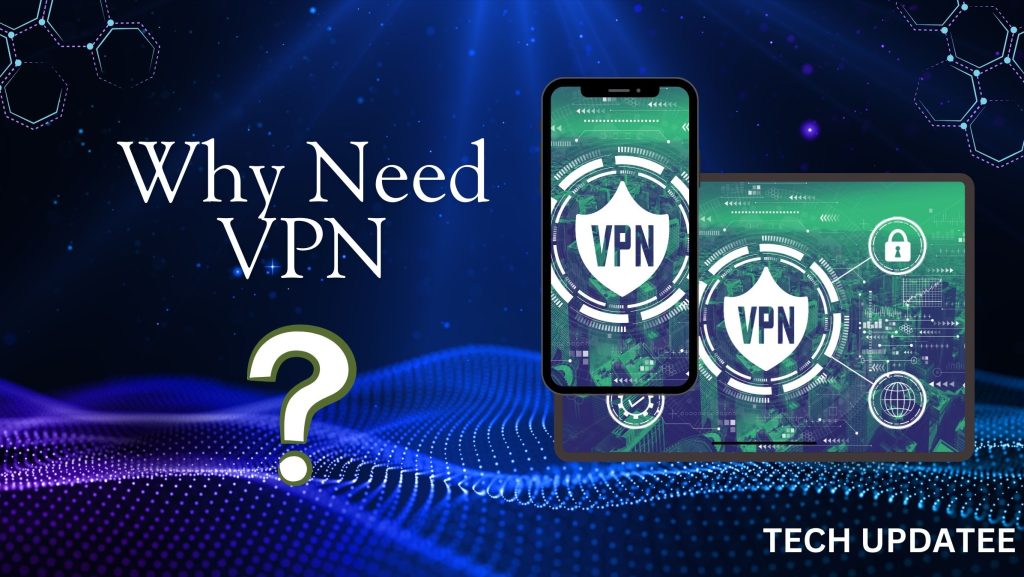What VPN Means Online security and privacy are more crucial than ever in the modern digital environment. A lot of people are searching for methods to safeguard their private data when using the internet. Using a VPN is among the greatest ways to deal with this. However, what is a VPN and how does it operate?
This beginner’s guide will explain what VPN means, how it works, why you need it, and how to choose the best one for your needs.
Contents
What VPN Means: A Simple Explanation

Virtual Private Network is what VPN stands for. By encrypting your internet connection and concealing your true IP address, this technology lets you stay anonymous online.
Your internet traffic is routed via a secure server located in a different location when you use a VPN. Because of this, it becomes more difficult for governments, hackers, and even your Internet service provider (ISP) to monitor your online activity.
To put it simply, a VPN is a technology that offers freedom, security, and privacy when using the internet.
How Does a VPN Work?

A VPN works by creating a secure tunnel between your device and the internet. Here’s how it works step by step:
a) Connection to a VPN Server
When you activate a VPN, it connects to a remote server located in another country or region.
b) Data Encryption
All the data sent between your device and the VPN server is encrypted. This means that even if someone intercepts your data, they cannot read it.
c) Masking Your IP Address
The VPN replaces your real IP address with the server’s IP address. This helps you stay anonymous and bypass location-based restrictions.
d) Secure Data Transfer
With a VPN, your online activities, passwords, and personal information remain protected, even on public Wi-Fi networks.
Why You Need a VPN

Using a VPN offers several benefits. Here are the main reasons why people use it:
a) Online Privacy Protection
A VPN keeps your browsing history and personal data private by hiding your IP address from websites, advertisers, and hackers.
b) Security on Public Wi-Fi
Public Wi-Fi in cafes, airports, and hotels is not secure. A VPN encrypts your connection, making it impossible for cybercriminals to steal your data.
c) Access Blocked Content
Some websites, apps, and streaming services are restricted in certain countries. A VPN allows you to bypass these restrictions and access global content.
d) Prevent ISP Tracking
Your ISP can track and log your browsing history. A VPN prevents this by encrypting your internet traffic.
e) Safe Online Transactions
When shopping or banking online, a VPN adds an extra layer of security, protecting your credit card details from cyber threats.
Types of VPNs: Which One is Right for You?
There are different types of VPNs, and each serves a specific purpose.
a) Personal VPN (Consumer VPN)
This type of VPN is designed for individuals who want to protect their privacy and access restricted content. Popular VPN providers include NordVPN, ExpressVPN, and Surfshark.
b) Corporate VPN (Business VPN)
Companies use corporate VPNs to allow employees to securely access internal networks from remote locations.
c) Free vs. Paid VPNs
- Free VPNs: These may have limited features, slow speeds, and weak security.
- Paid VPNs: Offer strong encryption, unlimited data, and high-speed connections.
For the best security and performance, it is recommended to choose a paid VPN service.
How to Set Up a VPN in Simple Steps
Setting up a VPN is easy and can be done in a few minutes. Here’s how:
Step 1: Choose a VPN Provider
Select a reliable VPN service like NordVPN, ExpressVPN, or CyberGhost.
Step 2: Download and Install the VPN App
Install the VPN app on your computer, smartphone, or tablet.
Step 3: Log in and Connect to a Server
Open the app, log in, and choose a server location based on your needs.
Step 4: Start Browsing Securely
Once connected, your internet traffic will be encrypted, and you can enjoy secure and private browsing.
Common VPN Myths and Misconceptions
a) VPNs Are Only for Hackers
False! VPNs are used by millions of people worldwide to protect their online privacy.
b) VPNs Slow Down Internet Speed
A good VPN provider has optimized servers that ensure fast and stable connections.
c) VPNs Are Illegal
VPNs are legal in most countries, but some governments restrict their use. Always check the laws in your country.
d) Free VPNs Are Just as Good as Paid VPNs
Free VPNs often log your data, have slow speeds, and offer limited security features.
How to Choose the Best VPN
If you are looking for the best VPN service, consider the following factors:
a) Strong Security Features
Look for AES-256 encryption, a no-logs policy, and a kill switch to protect your data.
b) High-Speed Servers
A good VPN should have fast servers in multiple locations to ensure smooth streaming and browsing.
c) Compatibility with Devices
Make sure the VPN supports Windows, macOS, Android, iOS, and routers.
d) Customer Support
24/7 customer support is important if you need help setting up or troubleshooting the VPN.
e) Money-Back Guarantee
Choose a VPN that offers a 30-day money-back guarantee so you can test it risk-free.
Conclusion
You can see why a VPN is a crucial tool for online security and privacy now that you know what it is. A VPN is essential whether you want to access content that is blocked, safeguard your personal information, or browse the internet anonymously.
You may have a more secure and private internet experience by selecting a trustworthy VPN service. Take charge of your internet security by utilizing a VPN right now!
FAQs
What does VPN mean in simple terms?
A VPN (Virtual Private Network) is a tool that encrypts your internet connection and hides your IP address, keeping your online activities private.
Is using a VPN legal?
Yes, VPNs are legal in most countries. However, some countries, like China and Russia, have restrictions on VPN usage.
Can a VPN make me completely anonymous?
A VPN increases privacy but does not make you 100% anonymous. To enhance anonymity, use it with Tor Browser and secure browsing habits.
Does a VPN work on all devices?
Yes, most VPNs work on Windows, macOS, Android, iOS, Linux, Smart TVs, and routers.
Can I use a VPN for Netflix and streaming?
Yes! Many VPNs allow you to bypass geo-restrictions and watch content from different countries on Netflix, Hulu, Disney+, and more.
